The UK needs major surgery and we must be open-minded about what the future of these islands should look like, writes Glyndwr Cennydd Jones
The summary paper Constitutional Relationships and Sovereignty in these Isles, circulated in early September 2019, highlights the needs to explore various constitutional models of reform for the UK generally, and Wales specifically.
Written constitutions make the machinery of government more accessible and transparent. The most successful constitutions articulate the basic framework of governance and are open to changes when needed, such as the pooling of sovereignty in international treaties and bodies.
They also balance essential principles with current and developing demands which may necessitate a responsibility of government to be reassigned from one ‘level’ to another. Creating such a written framework could prove invaluable across the political spectrum, with some finding reassurance in attempting to articulate the more distinctive elements of the UK’s practices in a codified constitution, and with others seeking to cement the sovereignty position of the four nations in relation to a common British civic structure.
The following illustrated options condense the several applications of a partially sovereign and sovereign Wales in relation to a selection of potential isle-wide and European structures, including federalism, confederalism, and models in-between…
Devolution
A sovereign Westminster leasing, in effect, some sovereign authority to the devolved institutions.
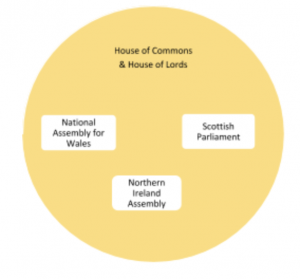
An individual is a citizen of the unitary state incorporating Wales, Scotland, Northern Ireland, and England, which is formally known as the United Kingdom (UK).
Central institutions are in place to implement most taxes, alongside some fiscal decentralisation to the devolved institutions. There is an official common currency and a central Bank of England.
The current statutes founding the devolved institutions provide for and limit powers of the legislatures and administrations, and divide responsibilities between the territories and the centre. These have legal basis in the Wales Act 2017, Scotland Act 2016, and Northern Ireland Act 1998. England continues to be omitted from the devolution reforms, without its own discrete parliament.
There are three distinct legal jurisdictions operating in the UK namely England & Wales, Scotland, and Northern Ireland. The Supreme Court of the United Kingdom is the ultimate authority.
Federalism including England as a single unit
A partially sovereign Wales sharing sovereignty in a Federation.
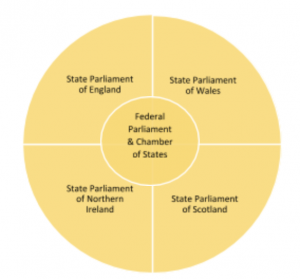
An individual is a citizen of the central overarching structure and the constituent nation within which they reside, participating democratically in electing representatives to the legislative parliaments at both levels of government, and with rights of movement, residence, and employment across the whole.
Central institutions implement many taxes, alongside a measure of fiscal decentralisation to the constituent nations. There is a formal common currency and a central federal bank.
Practices are confirmed through a written constitution, identifying those powers assigned to the centre, which may typically cover: the armed and security forces; border, diplomatic and international affairs; shared public services; cross-recognition of legal jurisdictions; currency and monetary policies; a single market, and select taxation. The remainder rests with the constituent nations.
Each constituent nation may or may not operate its own legal jurisdiction. The constitution and a charter of rights, by which public institutions must abide, are enforced by a Supreme Court of the Federation.
Federalism: with regions of England
A partially sovereign Wales sharing sovereignty in a Federation.
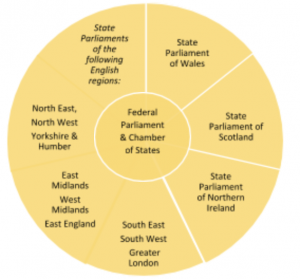
An individual is a citizen of the central overarching structure and the state within which they reside, participating democratically in electing representatives to the legislative parliaments at both levels of government, and with rights of movement, residence, and employment across the whole.
Central institutions implement many taxes, alongside a measure of fiscal decentralisation to the states. There is a formal common currency and a central federal bank.
Practices are confirmed through a written constitution, identifying those powers assigned to the centre, which may typically cover: the armed and security forces; border, diplomatic and international affairs; shared public services; cross-recognition of legal jurisdictions; currency and monetary policies; a single market, and select taxation. The remainder rests with the states.
The English regions are subject to the laws of England, with other states operating distinct legal jurisdictions. The constitution and a charter of rights are enforced by a Supreme Court of the Federation.
Confederalism
A sovereign Wales pooling a few key functions within a British Confederation for the reasons of efficiency and common security.
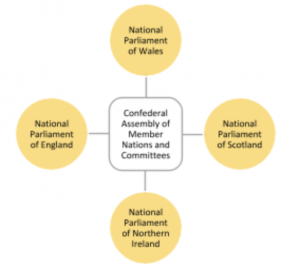
National parliaments, not individuals, are represented in the Confederal Assembly. Citizens relate to their nations foremost, with rights of movement, residence, and employment in neighbouring countries subject to negotiation.
Joint budgetary funds are raised annually through each member nation’s contribution of a defined proportion of their GDP. The nations operate distinct tax regimes. There is no central confederal bank, but nations may agree to use another member’s currency, subject to the usual constraints.
Confederations are typically established by treaty, addressing limited shared interests such as internal trade, use of currencies, defence, and foreign relations. Decisions made by a unicameral Confederal Assembly are not in the character of laws acting upon members, requiring implementation by each individual nation to take effect.
Nations operate separate legal jurisdictions and Supreme Courts.
Confederal-federalism
A sovereign Wales leasing some sovereign authority to a League or Union of the Isles, which is established by treaty or constitution.
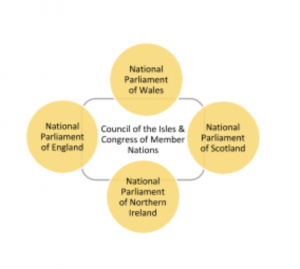
Individuals elect representatives to their respective National Parliament and a central Council of the Isles, relating to their member nation, initially, and to the League or Union next, and with rights of movement, residence, and employment in all nations.
The Council levies charges upon each member nation according to a defined proportion of their GDP annually. Aspects of federal-type control support fiscal decentralisation away from the UK position, with nations operating distinct tax regimes unless centrally assigned. There is an official common currency and a central Bank of the Isles.
Each nation holds all powers which are not delegated to the centre. The Council enacts legislative authority on matters involving defence, foreign affairs, internal trade, currency, large-scale economics, and home affairs. A Congress of Member Nations promotes cooperation across borders.
Each nation operates its own legal jurisdiction. A Supreme Court of the Isles is the ultimate authority on the legitimacy of any laws and rights.
Independence within the European Union (EU)
A sovereign Wales leasing some sovereign authority to the EU, with aspects of federal-type control built into key policy areas.
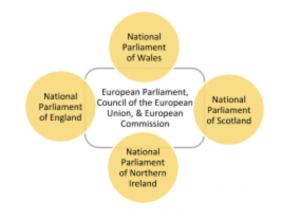
Individuals elect representatives to their respective National Parliament and a central European Parliament, relating to their member nation, initially, and to the EU next, and with rights of movement, residence, and employment in every EU nation.
The EU levies charges upon member nations, each of which operate distinct tax regimes. There is an official common currency and a central European Bank.
Nations hold all powers which are not delegated centrally. Shared concerns cover large scale economic factors, including monetary practices and a single market, as well diplomacy, security, and social policies.
Each nation has its own legal jurisdiction. For certain interests an EU legal framework is in operation with an EU Court of Justice.
Photo by Ugur Akdemir on Unsplash
All articles published on Click on Wales are subject to IWA’s disclaimer.





